-
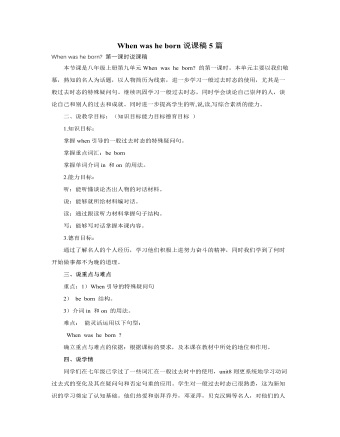
人教版新目标初中英语八年级上册When was he born说课稿5篇
1. 教学重点(1)新单词及目标语言的掌握。(2)听、说、读、写的综合训练。(3)对对合作及小组合作练习口语的训练。2. 教学难点(1)when所引导的特殊疑问句。(2)询问生日与出生年月日的区别。When is your birthday? (一般现在时)When were you born?(一般过去时) (3)表达年月日时所用的不同介词:in+年/月;on+日期二、教学方法。由浅入深,由易到难,由已知到未知,从学生熟悉的运动明星、电影明星甚至是歌手入手,调动他们的学习积极性,让他们在心情愉快、兴趣浓厚的氛围中展开一系列听说读写的训练,主动地投入到学习中去,自然地掌握本单元的重点、难点;循序渐进地深化教学内容,同时以训练学生听说为主,展开以老师为主导,以学生为主体的师生双边互动活动。三、教学手段。利用名人图片来辅助新的语言知识的巩固和训练;采用多媒体教学,并把听力内容录到电脑中,锻炼了学生的视听能力,提高了教学效果。
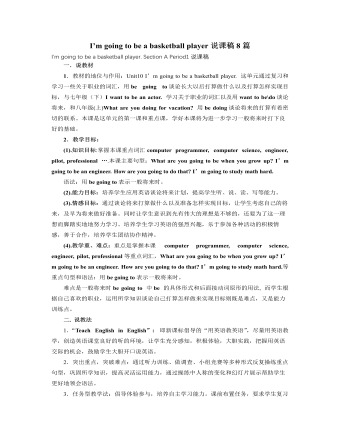
人教版新目标初中英语八年级上册I’m going to be a basketball player说课稿8篇
根据刚才调查和学生的汇报,我们很自然地可以把调查的内容汇编成一篇口头文章。为了更好的指导学生运用be going to 来进行写作,我们可以把课本上的范文给大家朗读一遍,分析如何来写My dream job.然后,可以当堂让学生模仿来进行一篇作文创造,My dream job.【设计意图】最后的写作环节是本课的提升,学生说的都不错,但落实到笔头,总是会出现这样那样的错误。如何让学生运用be going to 来进行作文创作是我们本课的重点和难点。因此很有必要当堂落实。环节6 Summary学生在老师的指导下进行课堂小结。1.重点句型:2.be going to 的用法。【设计意图】教师引导学生课堂小结,既是对文本内容的复习,又是为下节课打好铺垫,同时充分体现了学生是学习的主体地位,增强了学生自主学习的能力,可谓一举多得。
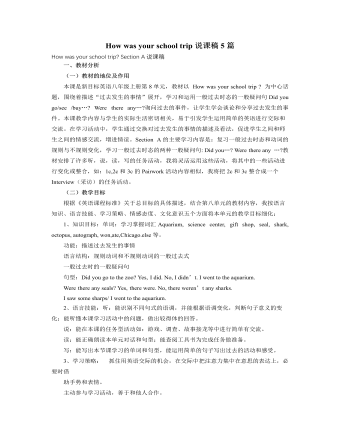
人教版新目标初中英语八年级上册How was your school trip说课稿5篇
If you are sandy,, you want to invite you good friends to come to you party, and you need their help, too..Make a list of things you want to buy and to do first, then discuss in group,act it out..让学生进行评价.评出有特色的“最佳表演”“最佳创意”“最…”小组,给予奖励。6.总结本课的target language.7.Homework.Invite your friends to have a picnic with you, and ask for their help to prepare for the picnic.. make a conversation. 8.教学反思如何激发学生的兴趣, 使他们主动积极地参与活动,开展合作学习, 使课堂充满活力,使设计的每个任务产生实效, 这是任务型教学中的首要问题. 本节课开展小组竞赛, 任务链为:游戏热身( 巩固词汇), 讨论(学习运用句型), 表演(综合运用)等活动, 逐步递进, 从简到难, 从谈论Sally 的周末, 到谈自己一周里所干的家务,电话邀请和请求帮助 ,都是来自现实生活的话题, 极具真实性. 为学生综合表达提供了丰富的素材.让学深入、让学生参与过程的评价体现了以学生为主体的教学理念.
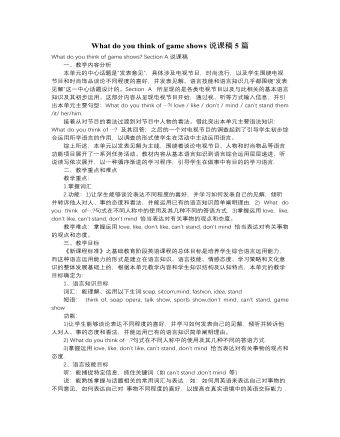
人教版新目标初中英语七年级下册What do you think of game shows说课稿5篇
步骤二 看图学单词我把本单元有关的单词制成图片显示在屏幕上。目的在于通过直观的画面效果和有意义的情景,便于学生更快地把单词的声、形和意联系起来。使学生轻松地掌握这些单词的音、形、义,且充分调动了学生的学习热情,让学生在思考中理解所学的生词。如 sitcom( situation comedy)1.猜。点击屏幕上一副有关情景喜剧的图片。说This is s kind of funny show. We call it sitcom. The people in sitcoms do or say things that make Tv watchers laugh.让学生根据图片和教师的提示猜出单词的意思。这时再告诉学生们sitcom=situation comedy.一定会有很多同学争先恐后地抢答,我们可以挑三个不同层次的学生起来回答,这样做既发挥了优等生的带头作用,同时为待优生树立起学好英语的信心,又增强了其他同学的竞争意识(他会我也会),也融入了教师的情感价值观之中。
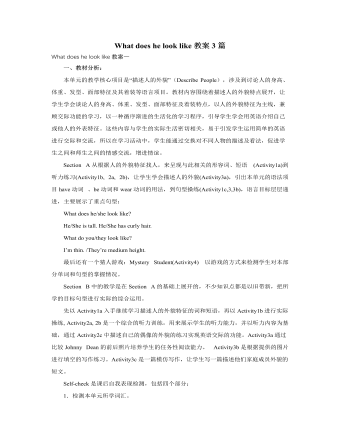
人教版新目标初中英语七年级下册What does he look like教案3篇
所需要用到的句子:Who is that?That is Jack. I like him.Why do you like him?I like him because he is interesting.Task 4: 设计理想中的人类Step one: 设计理想中的人类的外貌。把全班同学分成若干小组,学生可以边说边在纸上画出他们的模样。Step two: 设计理想中人类的性格。学生们可以把那些能描述性格的单词写在图画的旁边。Step three: 每组选出一名同学,其他同组同学提问,他作简单回答,并说明原因。所需用到的句子:What does he or she look like?He or she ...What is he or she like?He or she is ...Why?Because ...Task 5: 挑战性活动调查性格是天生的还是后天形成的,让每个同学回家去调查一下自己成长过程中性格是否有变化,具体是怎样的,为什么会这样? Teaching Aims:1. Enable students to have a general understanding of how to talk about people's physical appearance.2. Enable students to tackle some essential vocabularies and patterns about describing people. Provide them with necessary skills and methods.3. Create various chances for students to describe the persons they're familiar with, such as classmates, family members, teachers, idols, etc.

人教版新目标初中英语八年级下册It’s a nice day, isn’t it教案2篇
"Hello! Welcome to English class! Introduce yourself. Meet your new classmates." That's what the teacher says. What do you say? "Oh no!" It can be difficult talking to new people. But it can be fun, and you can make friends. How do you do it? Make small talk. Small talk is polite conversation. "Wang Nan is a great pingpang player, isn't she?" "I'd love to meet her, wouldn't you?" "It's been raining a lot, hasn't it?" Tag questions are a form of polite speech. To make small talk successfully, you should know how to make them. You should also know what topics to talk about. Try to learn this unit carefully. The next time you're in English class, you'll find out. Making small talk's easy, isn't it? (“你好!欢迎你!请做一下自我介绍。认识一下你的新同学。”通常在课上老师会这样说。你会说什么呢?“噢,不!”与陌生人谈话太困难了。但是这也很有意思,并且你还能交到朋友。你该怎么做呢?闲聊。闲聊指得是礼貌的对话。“王楠是一个很棒的乒乓球运动员,不是吗?”“我希望自己能认识她,你呢?“今年的雨水很多,不是吗?”反意疑问句是一种礼貌用语。为了使得谈话成功,你应该知道怎样去进行闲聊。你还应该知道与不同的人该谈论什么样的话题。认真的学习这个单元吧,下次在英语课上,你会发现与大家展开谈话是一件很容易的事情,不信我们来试试。)

人教版新目标初中英语八年级下册He said I was hard-working教案2篇
This activity introduces some new vocabulary and provide oral practice using the target language.Task 1 . Ask four students to stand in front of the class, and the teacher asks them the following questions as a reporter.1.What are you going to do when you grow up?2.What are you going to do next week?3.What are going to do after school?The students will give different answers, then ask a good student to report what they said.I am going to e a doctor.What did she say?----------She said she was going to be a doctor.I am going to have a party on Friday night.What did he say?-------He said he was going to have a party on Friday night.I am going to do my homework.What did she say ?------ She said she was going to do her homework.I am going home after school.What did she say?-----She said she was going home after school.Say In this unit we are going to learn to use words like to report what someone said.Task 2. Read the instructions. Then ask a student to read the four questions. And write the words on the Bb. Explain what soap opera is.Task 3. Ask the students to Look at the pictures, point out the TV screens in the picture. Ask one girl to read what Marcia said.What did Marcia say? She said She said she was having a surprise party for Lana on Friday night. Repeat the other pictures in the same way.Activity3. Listen and number the pictures in activity 1a.
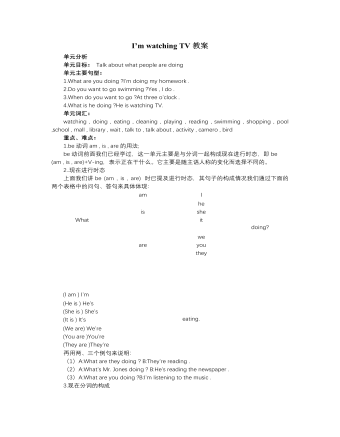
人教版新目标初中英语七年级下册I’m watching TV教案
单元分析单元目标: Talk about what people are doing 单元主要句型:1.What are you doing ?I’m doing my homework .2.Do you want to go swimming ?Yes , I do .3.When do you want to go ?At three o’clock .4.What is he doing ?He is watching TV. 单元词汇:watching , doing , eating , cleaning , playing , reading , swimming , shopping , pool ,school , mall , library , wait , talk to , talk about , activity , camero , bird 重点、难点:1.be动词am , is , are的用法;be动词前面我们已经学过,这一单元主要是与分词一起构成现在进行时态,即be (am , is , are)+V-ing,表示正在干什么。它主要是随主语人称的变化而选择不同的。2..现在进行时态上面我们讲be (am , is , are) 时已提及进行时态,其句子的构成情况我们通过下面的两个表格中的问句、答句来具体体现:3.现在分词的构成现在进行时态中be + V - ing 的构成中V-ing被称为现在分词,它的基本构成是动词原形+ing,但也有些特殊情况,下面分几类说明:(1)一般情况+ing如:read→reading,go→going,do→doing,look→looking,listen→listening,watch→watching.(2)以不发音的e结尾的词,去掉e,再加ing.如:write→writing,skate→skating,type→typing,wake→waking,make→making
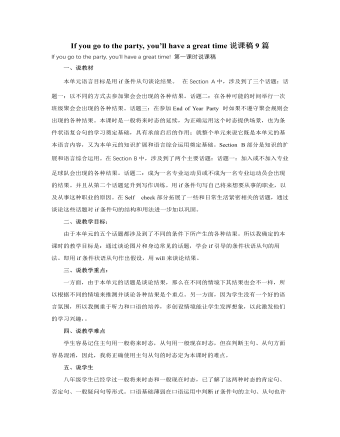
人教版新目标初中英语八年级下册If you go to the party, you’ll have a great time说课稿9篇
二、说教学目标:由于本单元的五个话题都涉及到了不同的条件下所产生的各种结果。所以我确定的本课时的教学目标是:通过谈论图片和身边常见的话题,学会if引导的条件状语从句的用法。即用if条件状语从句作出假设,用will来谈论结果。三、说教学重点:一方面,由于本单元的话题是谈论结果,那么在不同的情境下其结果也会不一样,所以根据不同的情境来推测并谈论各种结果是个重点。另一方面,因为学生没有一个好的语言氛围,所以我侧重于听力和口语的培养,多创设情境能让学生发挥想象,以此激发他们的学习兴趣,。四、说教学难点学生容易记住主句用一般将来时态,从句用一般现在时态,但在判断主句、从句方面容易混淆,因此,我将正确使用主句从句的时态定为本课时的难点。
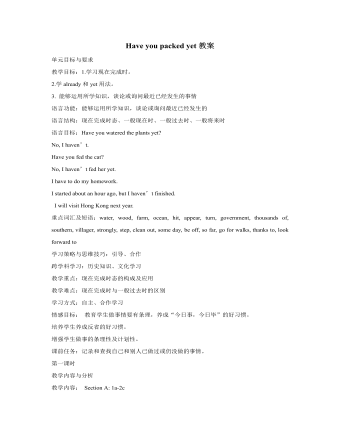
人教版新目标初中英语九年级下册Have you packed yet教案
教学目标:1.学习现在完成时。2.学already和yet用法。3. 能够运用所学知识,谈论或询问最近已经发生的事情语言功能:能够运用所学知识,谈论或询问最近已经发生的语言结构:现在完成时态、一般现在时、一般过去时、一般将来时语言目标:Have you watered the plants yet?No, I haven’t.Have you fed the cat?No, I haven’t fed her yet.I have to do my homework. I started about an hour ago, but I haven’t finished. I will visit Hong Kong next year.重点词汇及短语:water, wood, farm, ocean, hit, appear, turn, government, thousands of, southern, villager, strongly, step, clean out, some day, be off, so far, go for walks, thanks to, look forward to学习策略与思维技巧:引导、合作跨学科学习:历史知识、文化学习教学重点:现在完成时态的构成及应用教学难点:现在完成时与一般过去时的区别 学习方式:自主、合作学习 情感目标: 教育学生做事情要有条理,养成“今日事,今日毕”的好习惯。培养学生养成反省的好习惯。增强学生做事的条理性及计划性。课前任务:记录和查找自己和别人已做过或仍没做的事情。

人教版新目标初中英语九年级上册Teenagers should be allowed to choose their own clothes教案2篇
Step 1 Greeting Greet the class and check the homeworkStep 2 A duty report The S on duty gives a report on the rules in his home and lead in 3a “Sun Fei’s and Wu Yu’s rules” Step 3 ReadingSs read the conversation and write the two girls’ rules in the chart. Check the answers.Get Ss to read after the tape and then read aloud by themselves. Then, T explains the language points.Step 4 Pairwork 3bRole play. Use the information in chart to practice with the conversation in 3a covered. They can look at the sample conversation in the right box.Step 5 Task 2 “Who’s the best reporter?”Make a survey by asking any 5 students the questions in the chart in activity 4. Then give out a report about it. See who is the best reporter? And the best reporter will get a nice ball-pen.Step 6 Summary and homework:Write out the report in your exercise-books.Period ThreeStep 1 Greeting and a duty reportThe S gives a duty report talking about his experience of being late for school. Lead in the question “Do you ever get to school late? How often do you get to school late? Always, usually, sometimes, or never?Step 2 1a Get Ss to finish writing.Step 3 Pairwork 1b Get Ss to talk about their answers with their partners using the sample conversation in the box on the right.Step 4 Listening practice2a Lead-in: What will happen if you get to school late? What about Peter? Let’s listen to a conversation between Peter and his father. Get Ss to finish 2a (As usual, for the first time, Ss only listen.) Check the answers.
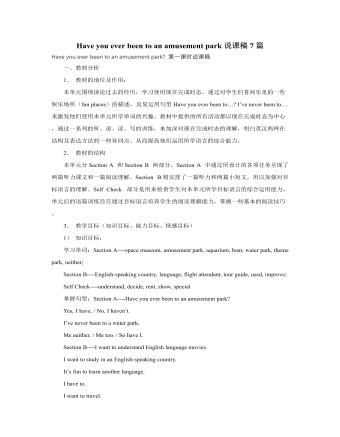
人教版新目标初中英语八年级下册Have you ever been to an amusement park说课稿7篇
1. 教材的地位及作用:本单元围绕谈论过去的经历,学习使用现在完成时态。通过对学生们喜闻乐见的一些娱乐场所(fun places)的描述,反复运用句型Have you ever been to…? I’ve never been to…. 来激发他们使用本单元所学单词的兴趣。教材中提供的所有活动都以现在完成时态为中心,通过一系列的听、说、读、写的训练,来加深对现在完成时态的理解,明白英汉两种在结构及表达方法的一些异同点。从而提高他们运用所学语言的综合能力。2. 教材的结构本单元分Section A 和Section B 两部分。Section A 中通过所设计的各项任务呈现了两篇听力课文和一篇阅读理解。Section B则安排了一篇听力和两篇小短文,用以加强对目标语言的理解。Self Check 部分是用来检查学生对本单元所学目标语言的综合运用能力。单元后的语篇训练旨在通过目标语言培养学生的阅读理解能力,掌握一些基本的阅读技巧。3. 教学目标(知识目标、能力目标、情感目标)
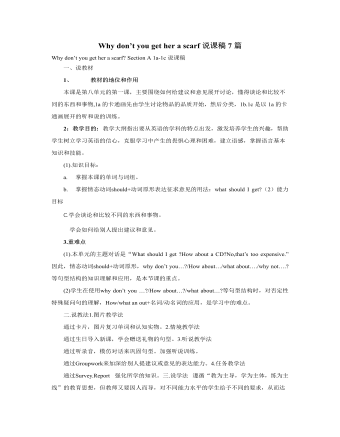
人教版新目标初中英语八年级下册Why don’t you get her a scarf说课稿7篇
[设计意图: 该环节可让学生展示自我,拓宽运用英语能力,把所学的知识在实际交流中进行运用,实现新课程倡导的“为用而学, 在用中学,学了就用”,从而提高学生综合运用英语的能力。选择母亲节来临为母亲选择礼物这一话题也是借此机会对学生进行感恩教育,并在学生的热烈讨论中告诉学生gift can’t be everything, everything can be a gift.使学生的情感得到升华。] Step9 Summary T: What have we learned in this class? Presents/ Gifts Comments Suggestions Album----special Why don’t you … Bicycle----useful Why not … +V原形 Calendar----interesting How about … Scarf----personal What about … +V-ing/ 名词 [设计意图:此环节的设计,有助于理清脉络,进一步巩固所学知识。] Step10 Homework 1. listen to 1b (do 1b and imitate ) 2. Write down your dialogue 3. Surf the internet about the differences of gift giving between China and foreign countries. [设计意图:作业1听力,由于1b听力和后面的2a相似,所以课堂上不再重复做,将其留做课后作业,上课下课时刻关注学生听力能力的培养和训练。2是将学生课堂上的说落实到课后的写。3是让学生通过自主学习,了解中西方文化的差异。分层次布置作业,体现出因材施教的教学理念。]
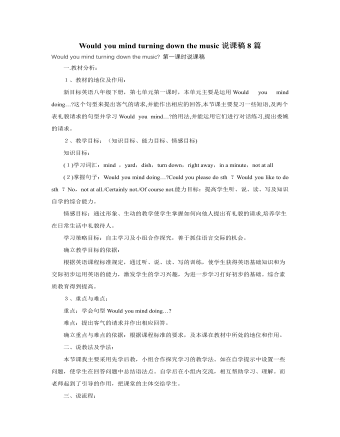
人教版新目标初中英语八年级下册Would you mind turning down the music说课稿8篇
一.教材分析: 1、教材的地位及作用:新目标英语八年级下册,第七单元第一课时,本单元主要是运用Would you mind doing…?这个句型来提出客气的请求,并能作出相应的回答,本节课主要复习一些短语,及两个表礼貌请求的句型并学习Would you mind…?的用法,并能运用它们进行对话练习,提出委婉的请求。2、教学目标:(知识目标、能力目标、情感目标)知识目标:(1)学习词汇:mind ,yard,dish,turn down,right away,in a minute,not at all(2)掌握句子:Would you mind doing…?Could you please do sth ?Would you like to do sth ?No,not at all./Certainly not./Of course not.能力目标:提高学生听、说、读、写及知识自学的综合能力。情感目标:通过形象、生动的教学使学生掌握如何向他人提出有礼貌的请求,培养学生在日常生活中礼貌待人。学习策略目标:自主学习及小组合作探究,善于抓住语言交际的机会。
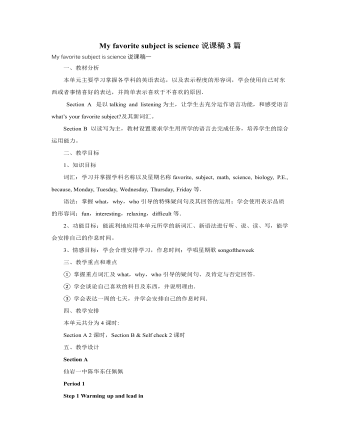
人教版新目标初中英语七年级上册My favorite subject is science说课稿3篇
(四)、归纳总结就学生在语言实践中出现的问题及时进行归纳总结,提醒学生关注。(五)、应用性操练1、填空、(旨在培养学生运用所学知识灵活解决问题的能力。)2、根据问话写答语和根据答语写问话(让学生在理解的基础上灵活运用所学知识,并且有意识地拓展学生思维,让学生不局限于一种答案。)3、翻译句子(旨在培养学生综合运用语言的能力和逻辑思维能力,有意识的培养学生的语感。)八、拓展性训练最后,我设计了这样一个活动,让学生就“最喜欢的动物”“最喜欢的城市”“最喜欢的学科”“最喜欢的季节”“最喜欢的演员”“最喜欢的……”等方面去调查身边的同学,这项活动将学生从最喜欢的学科和老师引向最喜欢的其它事物,引导学生联系上学期所学过的动物、城市、和季节,一方面加强了旧知识和新知识之间的联系,另一方面也拓展了学生的思维,引导学生多角度,多方位的去考虑问题。
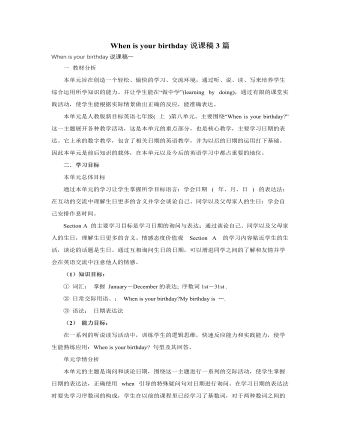
人教版新目标初中英语七年级上册When is your birthday说课稿3篇
一 教材分析 本单元旨在创造一个轻松、愉快的学习、交流环境,通过听、说、读、写来培养学生综合运用所学知识的能力。并让学生能在“做中学”(learning by doing),通过有限的课堂实践活动,使学生能根据实际情景做出正确的反应,能准确表达。本单元是人教版新目标英语七年级( 上 )第八单元。主要围绕“When is your birthday?”这一主题展开各种教学活动,这是本单元的重点部分,也是核心教学,主要学习日期的表达。它上承的数字教学,包含了相关日期的英语教学,并为以后的日期的运用打下基础。因此本单元是前后知识的载体,在本单元以及今后的英语学习中都占重要的地位。 二.学习目标本单元总体目标 通过本单元的学习让学生掌握所学目标语言;学会日期 ( 年、月、日 ) 的表达法;在互动的交流中理解生日更多的含义并学会谈论自己、同学以及父母家人的生日:学会自己安排作息时间。
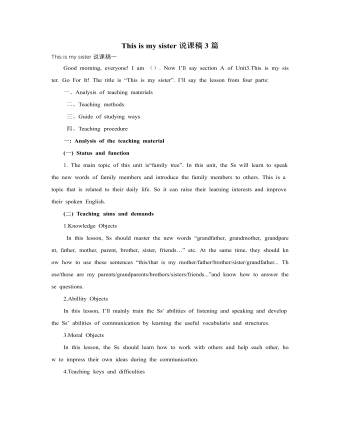
人教版新目标初中英语七年级上册This is my sister说课稿3篇
(四)教具的安排和使用依据英语教学的直观性,趣味性、实践性的教学原则,结合合作学习和任务型教学的新理念,我利用了照片、头饰、幻灯、录音、卡片、竞赛板、等媒体设计教学,学生则利用自制的头饰、家庭照等媒体积极参与教学活动。三.教学程序分析整个教学程序我采用了唱、听、说、玩、演一系列的教学活动,具体设计为热身——新知——趣味操练——巩固练习——总结Step1 课前热身幻灯放映并演唱family songStep 2、新知导入1)教师幻灯出示几张自己的家庭及朋友的照片并介绍This is some photos of my family or my friends. Who’re they? Do you know?自答:This is my father. That is my mother. These are my parents. Those are my friends.…为单词教学做准备的同时,本课重点句型也在情景中被输入。
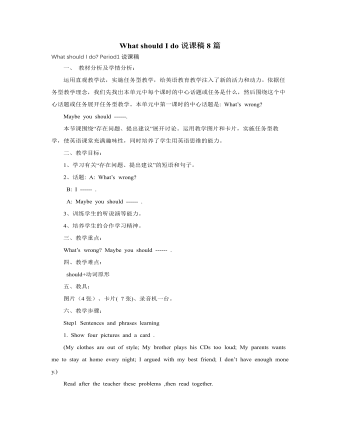
人教版新目标初中英语八年级下册What should I do说课稿8篇
七、教学反思在教学过程中全面培养了学生的英语听、说、运用等能力。直观式教学与任务型教学始终融为一体。通过开展活动,充分调动了学生学习英语的积极性、主动性和创造性。What should I do? Section A说课稿我说课的内容是义务教育课程标准实验教科书《新目标英语》八年级下册第二单元Section A,课题是“What should I do ?”本节说课内容分四个步骤:一、说教材 二、说教法 三、说学生 四、说教学过程。一、说教材(一)教材分析教材的地位和作用:第二单元承接八年级上册What’s the matter?中有关情态动词should 的用法,并作进一步的扩展和综合运用;本课是本单元的第一课时,集中呈现了本单元的基本词汇和语言结构,因此,本课教学有着承上启下的重要作用。(二)教学目标1知识目标:学会使用情态动词should、could,学习并使用新单词2能力目标:(1)能够谈论自己的麻烦和问题。(2)能够为他人的问题找到合理的解决办法,提出相应的建议。(3)能够从他人的建议中为自己的问题找到解决办法。
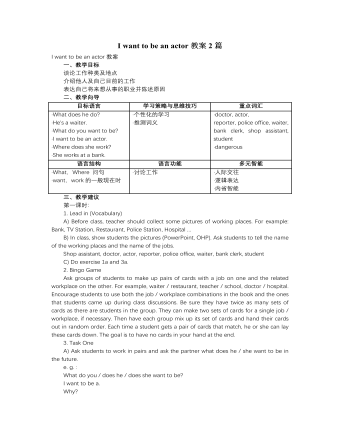
人教版新目标初中英语七年级下册I want to be an actor教案2篇
三、教学建议第一课时:1. Lead in (Vocabulary)A) Before class, teacher should collect some pictures of working places. For example: Bank, TV Station, Restaurant, Police Station, Hospital ...B) In class, show students the pictures (PowerPoint, OHP). Ask students to tell the name of the working places and the name of the jobs.Shop assistant, doctor, actor, reporter, police office, waiter, bank clerk, studentC) Do exercise 1a and 3a.2. Bingo GameAsk groups of students to make up pairs of cards with a job on one and the related workplace on the other. For example, waiter / restaurant, teacher / school, doctor / hospital. Encourage students to use both the job / workplace combinations in the book and the ones that students came up during class discussions. Be sure they have twice as many sets of cards as there are students in the group. They can make two sets of cards for a single job / workplace, if necessary. Then have each group mix up its set of cards and hand their cards out in random order. Each time a student gets a pair of cards that match, he or she can lay these cards down. The goal is to have no cards in your hand at the end.3. Task OneA) Ask students to work in pairs and ask the partner what does he / she want to be in the future.e. g. :What do you / does he / does she want to be?I want to be a.Why?Because it's (adj).B) Vocabulary: Section B, 1a4. Homework 1.2.

人教版新目标初中英语七年级下册How was your weekend教案2篇
Teaching Goal:1. General aims:Talk about recent past events2. Particular aims:A. Language Focus.Talk about recent past events and think of the past events.B. Language goalsHow was….?It was …What did …do over the weekend?C. Language structures:(1). How was your weekend? I was great. Pay attention to no form.(2). What did you do over the weekend? I played soccer. We went to the beach.D. Useful words and phrases:Words: was, did, went, beach, over, project, test, wasn’t, false, number, geography, spend, week, most, mixture, their, had, little, cook, read, saw, change, everyone, sit, sat, no, anythingPhrases: did one’s homework, played soccer, cleaned my room, went to the beach, played tennis, went to the movies, on Saturday morning, over the weekend, cook … for, what about, do some reading, have a party, talk show, go shoppingE. Grammar language:Present simple past tenseRegular and irregular verbsF. Learning strategies:Tour and holidaysG. Interdiscipinary:H. Emotion and manner:Teaching time: 5 periodsTeaching procedures:Period One教学步骤、时间 教师活动 学生活动 媒体应用Step 1Free talk 3’ Ask some questions like:Who’s on duty today?What’s the weather like? Answer and talk about something.让同学们回答下列问题1. Do you like weekend? (Let some students answer)It takes them three minutes to talk about the question.2. Why do you like weekend? (let the students answer) Most of the students like the weekend此时教师用汉语问:“在周末期间问你干了什么?这句话用英语这么回答?Let the students guess.At last the teacher give them right answer3. What did you do over the weekend?(板书、学习)